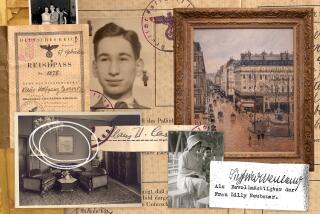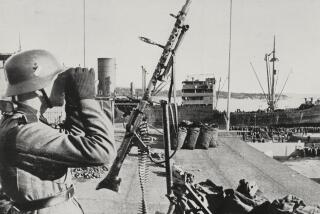Legendary Swiss Neutrality Rocked by WWII Charges
ZURICH, Switzerland — Georges-Andre Chevallaz, then a young lieutenant carrying a rifle, remembers when the Swiss army pulled back into the snowy Alps, expecting at any moment a blitzkrieg by the Nazis and their allies.
“After the defeat of France, Switzerland was completely encircled. It decided to defend itself in its mountain redoubt, but it also had to survive,” said Chevallaz, now 82, who went on to become president of his country.
Exactly how Switzerland made it through the dark, parlous years of World War II has become the topic of a rancorous and divisive dispute that has had repercussions all the way to Capitol Hill.
The Swiss like to think of themselves as the latter-day descendants of William Tell, the legendary medieval hero armed with a crossbow who helped spark the struggle for Swiss independence from foreign sovereigns. But recent revelations from once-classified British and U.S. wartime documents, as well as an energetic campaign on behalf of Holocaust survivors by international Jewish organizations, paint a very different picture.
“The question is, did the army save Switzerland, or did the bankers? Did dirty money?” said Max Frenkel, a journalist at Neue Zurcher Zeitung, the country’s most prestigious German-language newspaper.
The newly emerged picture suggests that the bankers, and Swiss business people and government leaders, helped secure Switzerland’s survival by acting as the Nazis’ “offshore bank,” by selling Adolf Hitler’s Reich weapons and manufactured goods and by purchasing the gold the Germans plundered from captive European nations.
In addition, tens of thousands of refugees, including Jews fleeing the “Final Solution” who had desperately hoped for safe harbor on Swiss territory, were turned back at the frontier. In some cases, they were placed right in the hands of the Gestapo.
“The facts are cruel. What we did, what they [previous generations of Swiss] did during the Second World War was terrible--was worse than Vichy [Nazi-allied France],” Jean Ziegler, a sociologist and member of the Swiss parliament from Geneva, said. “And the stonewalling about it--that’s typically Swiss.”
A Nation Unlike Any Other
Debate over this issue, only reluctantly considered by the Swiss half a century after the fact, is particularly painful here because it cuts to the marrow of what the nation is all about.
Since 1515, this polyglot land at the heart of Europe, famous for its watchmakers and industrious dairy farmers, has kept out of the Continent’s wars. In 1815, European diplomats at the Congress of Vienna guaranteed Switzerland’s perpetual neutrality after the last foreign soldier left the country the previous year.
“Switzerland milks its cow and lives peacefully,” 19th century French author Victor Hugo wrote somewhat enviously.
The Swiss came to think of themselves as a nation unlike any other, “a pure and heroic Switzerland that traverses the stormy centuries alone,” in the words of an editor from the French-language Nouveau Quotidien. This self-image was of a place where tolerance allowed speakers of the country’s four languages--German, French, Italian and Romansch--to coexist happily while the rest of Europe went to war.
Propriety, seriousness, rectitude and humanity--the Red Cross was the brainchild of a young Swiss, Jean Henri Dunant, in 1859--came to be taken for national virtues. As for the principle of neutrality, if it had stood up to the challenge of Hitler and Benito Mussolini, then why change it, even as other European countries, and most of the world, are spinning closer and closer ties?
In 1986, the Swiss, in a referendum, rejected joining the United Nations, though Geneva serves as the most important U.N. center after New York. Four years ago, Swiss voters turned down membership in the European Economic Area, a free-trade zone linking the European Union with European countries that do not belong to the EU.
Then the reality check of history began, and a darker, less heroic side of the collective Swiss character became visible to the general public, rather than just to historians bickering in scholarly journals. Last spring in the U.S., the Senate Banking Committee, chaired by Sen. Alfonse M. D’Amato (R-N.Y.), held hearings that accused the Swiss of profiting from the Holocaust even today by allegedly holding on to the savings of deceased victims.
A flurry of once-classified documents, known to historians but not to the general public, was produced that accused the Swiss of having served as the Third Reich’s bankers and as “fences” for the gold and artworks the Nazis plundered across Europe.
International Jewish organizations threw their weight and public relations and lobbying savvy into the fight. In a fund-raising letter, Edgar M. Bronfman, president of the World Jewish Congress, accused the supposedly upright Swiss of participating in “the worst robbery in the history of mankind.”
The sums still in the coffers of Zurich, it was claimed, run as high as $7 billion.
Many Swiss are still bewildered by what hit them. In 1995, their leaders for the first time admitted that the nation’s accommodation policies toward Nazi Germany went far beyond strict neutrality. But opinion polls have shown that most Swiss don’t want to dig up the past for reexamination. And many members of the older generation feel today’s debate ignores the harsh realities the country had to face at the time.
“We are not choirboys--nobody is,” said Chevallaz, who as well as being a former president of the Swiss Confederation is one of his country’s best-known historians and the author of a 32-year-old textbook still used in some Swiss schools. “Neutrality is not a glory, and it is not a virtue. Switzerland had to survive. Younger historians don’t understand the conditions of danger we were living in.”
One of those historians, Peter Hug, a researcher at the University of Bern, retorts that he is combating widely held fantasies.
“Switzerland was not so neutral, and it was not only because of the army that it was not touched by war,” Hug said. “These are two big myths.”
Last year, Hug coauthored a report for the Swiss Federal Department of Foreign Affairs documenting how dormant bank accounts that may have belonged to Jews slain in the Holocaust were handed over after negotiations to the governments of Communist Poland and Hungary, and how often little was done by the Swiss to track down account holders’ heirs.
“Our report shows that it is true that Switzerland was ruled by the banks, because they stood outside the constitution,” Hug said. He believes the banks still hold “billions and billions” in assets looted by the Nazis, although in 1952 Switzerland transferred more than $30 million for reparations and refugee relief to the United States--a sum the two countries agreed constituted half the liquidated value of Nazi property in Switzerland.
Charges and Threats Reopen Issue
The charges leveled by D’Amato and the threats of a boycott of Swiss banks by international Jewish groups have helped force a reopening of the question, though the Swiss initially were reluctant to respond, considering the dossier closed.
Now, a commission of historians is examining documents about Swiss actions during the war. A separate panel of “eminent persons,” led by former U.S. Federal Reserve Chairman Paul A. Volcker, is leading the search for dormant accounts that may belong to Holocaust victims.
Under increasing pressure, the banks conducted a search last year and reported finding $32 million in dormant accounts.
Early this month, in a bid to turn back the tide of bad publicity, the country’s three largest banks announced they would pay $71 million to assist Holocaust victims. And Wednesday, the Swiss government officially announced the creation of the fund.
This week the Simon Wiesenthal Center of Los Angeles put the Internet to work on behalf of Holocaust survivors and descendants by placing a list of vanished account holders onto the computer network. The list, accessible at https://www.wiesenthal.com, contains 1,500 names furnished by the Swiss Bank Corp.
As the search proceeds for the ill-gotten gains the Nazis stashed in Swiss vaults, and for savings that may have belonged to Jews who perished in concentration camps, many Swiss are looking in their own hearts about what their country should do to right the wrongs of the past. One is lanky, bespectacled Christoph Meili, 28, a Zurich security guard.
Security Guard Smuggles Documents
On Jan. 8, while on duty at the Union Bank of Switzerland, he came across two hoppers of historical documents waiting to be shredded. The previous month, banks had been ordered to keep paperwork from World War II-era transactions.
Meili grew suspicious. He smuggled some of the documents out of a bin and gave them to a local Jewish group and a journalist. “I think Switzerland has lots of money from that time,” Meili said. “I think it’s normal we give it back.”
Union Bank Senior Vice President Gertrud Erismann-Peyer has denied that the documents had any bearing on the current dispute, though Meili believes they chronicled real estate and business dealings in wartime Germany. For his actions, he is being investigated for possible violation of bank secrecy laws, and early this week he was reported to have been fired--effective the end of April--by the security company that employed him.
The historical record now being debated is complex, often contradictory. A total of 300,000 foreigners fleeing Nazism and Fascism passed through Switzerland in the period from 1933 to 1945, and a tenth or so were Jews. But Switzerland’s long-standing tradition of offering a haven to the persecuted was sorely tried by the Nazis’ campaign against the Jews. To stem the tide, the Swiss asked the Germans to mark the passports of Jews so they could not enter the country as German tourists, who did not require a visa.
The Germans began stamping Jews’ passports with a red “J.”
Ziegler, the sociologist and lawmaker, contends that his country, far from staying neutral, became a cog in the German war machine.
Swiss banks also bought gold the Germans had pillaged from the central banks of Belgium, the Netherlands and other occupied countries, which allowed the Third Reich to obtain Swiss francs, one of the few widely recognized currencies at the time.
One group has been caught in the middle of this debate: Switzerland’s small but long-standing Jewish community, which now numbers about 18,000. The charges against Switzerland have been followed by an upswing in the number of anti-Semitic letters written to newspapers and historians, recipients report.
But some Swiss Jews say their country’s fiercest critics, such as Avraham Burg, president of Israel’s semi-governmental Jewish Agency--who has accused Switzerland of serving as the “Nazis’ bank”--don’t understand the country’s predicament once it was encircled by Germany and its allies.
“Switzerland at the time was very much afraid: It’s so small, it was surrounded by the Nazis, people thought Hitler was going to come,” said real estate agent Nicole Poell-Krasek, vice president of Zurich’s Liberal Jewish Community. But she added, “We Swiss Jews are convinced that we have to bring light to the past. The average Swiss doesn’t want to find out about the war. He says: ‘It was 50 years ago. Let it lie.’ ”
More to Read
Sign up for Essential California
The most important California stories and recommendations in your inbox every morning.
You may occasionally receive promotional content from the Los Angeles Times.










